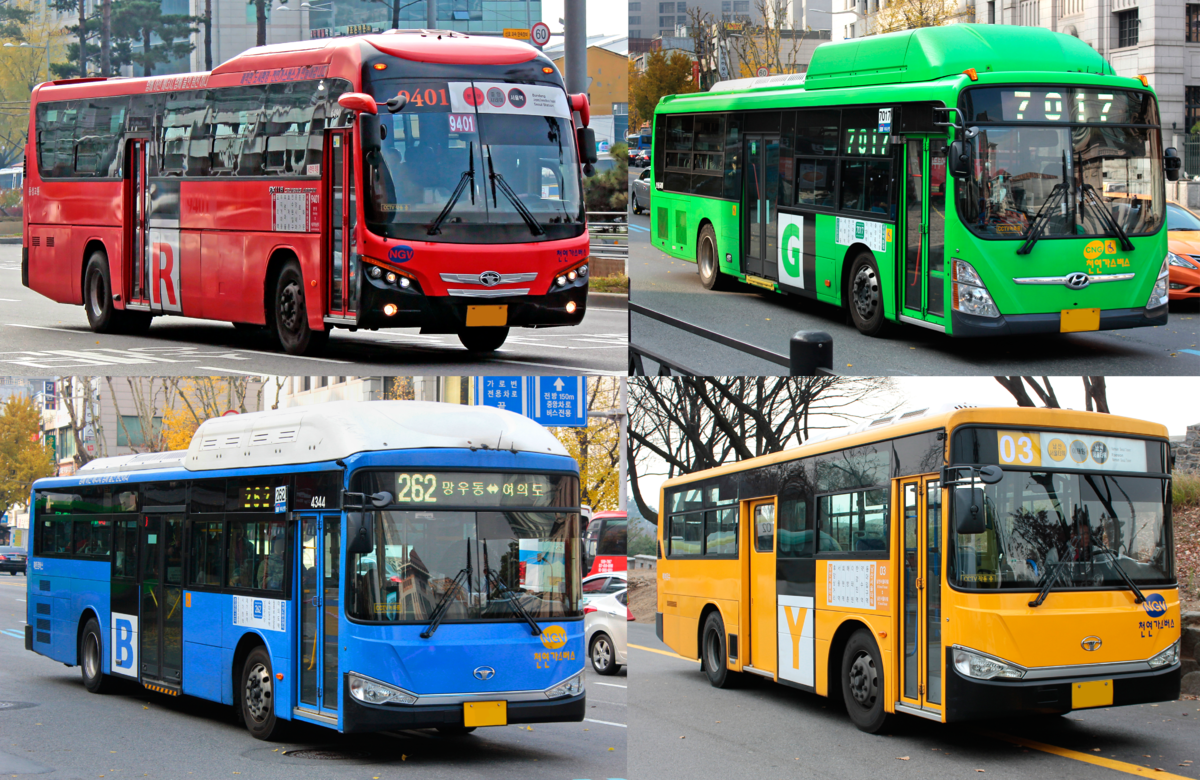6 Tips when traveling in Seoul

Probably the most important—and the most confusing—thing to figure out when traveling to somewhere new is how you’re going to get around. Not just from the airport to where you’re staying, but how you can get to the places you’re visiting while you’re there. If you’re heading to South Korea, we’ve collected all of the basic information you might need when traveling in Seoul and websites that might help answer any questions I happen to miss.
Table of Contents
Where do you go when you arrive at the airport?
The first thing anyone needs to worry about when landing in the Incheon International Airport is how they’re going to get to where they’re staying. More specifically, how are they going to get to Seoul?
This is relatively simple, actually.
The Incheon International Airport provides a couple of different public transportation options for you to utilize in order to get to Seoul. This includes different kinds of railways and bus lines.
Airport Railroad Express (AREX)
The AREX is the airport’s provided railway system that will take you to Seoul. There are two different trains you can take: the Express Train and the All Stop Train. Like their names, they each have a few different things they do. The Express Train will take you directly to the Seoul Station without stopping. Whereas the All Stop Train will stop by thirteen other stations on the way to Seoul Station.
Be aware that there are two terminals in the Incheon International Airport that these trains depart from.
Of course, since each train offers different things (zero stops vs. many stops; lots of room vs. less room), the price will vary for each. For the Express Train, it is 9,000 won for adults and 7,000 won for children. For the All Stop Train, it is 4,150 won from Terminal 1 Station and 4,750 from Terminal 2 Station.
If you’re purchasing a single-use transportation card, you will need to deposit 500 won into it. You can get a refund for it at the arrival station, though.
For a few instructions on where you can buy tickets and use these trains in the Incheon International Airport (with pictures!), you can visit this website to read more.
Airport Bus
Like the railway system provided by the airport, they also offer a couple different buses you can take. You can take a Deluxe Bus or a Standard Bus.
The Deluxe Bus runs on non-stop or shortened routes to major hotels and popular destinations. And the Standard Bus runs with more stops and smaller seats. Prices for these tickets may vary depending on where you’re going, so make sure to check with the ticketing offices for prices.
You can view the official airport’s website to see where they mark the locations of these ticketing offices.
What forms of public transportations can you use when traveling in Seoul?
Like any large city across the world, there are multiple different forms of public transportation you can take when traveling in Seoul. The main forms of public transportation include a subway system and multiple different busing options. However, there are slight differences to those systems in Seoul that you will need to know more about before traveling there.
I should also mention that there are various other forms of public transportation that you can use as well—including taxis and railways used to travel from city to city across South Korea. However, I will focus most on the subway and the bus systems that run directly in the city of Seoul.
The Seoul Subway System
The subway system in Seoul is just as confusing as any subway system around the world. With two different types of subways, the rapid transit and the commuter rail, there are several different lines.
For lines within the city, rapid transit lines, they are usually labeled by numbers (Line 1, Line 2, Line 3, etc.) with a few exceptions. And commuter rails are usually labeled by location names.
Though the subway map is a bit daunting to look at (or a lot daunting…), it is best to make sure you have a good understand of the path you are taking before you head to the subway.
You can do this a few different ways:
One: You can simply find out which stations are closest to where you are and closest to where you’re going and find a path that connects them. Some might include transfers, so you’ll need to be careful when manually finding your path.
Two: You can use the official Seoul Metro Cyber Station website. On this website, you can type in the station you are coming from and the one you are going to and it will calculate the best route for you. It will detail the transfer stations you might have and give the approximate time it will take to travel.
Three: There are a couple of apps that might be helpful for you: Naver Map and Kakao Metro. I will talk about these apps more in a later section.
For more information on the Seoul Metro, you can check out their User Guide on their official website.
The Seoul Bus System
Personally, I find bus systems to be a little bit more confusing in terms of travel. However, they do tend to have more stops and they might be closer to your location than a subway station. So, when traveling in Seoul by bus, there are a few things you need to know before you do.
Firstly, there are four different kinds of buses you can take. There are blue buses, green buses, red buses, and yellow buses. Each color of the bus differentiates the type of bus it is.
Blue buses run for longer distances throughout Seoul.
Green buses run on shorter distances and are used to transport passengers to and from their transfer points (for subways or other, longer bus routes).
Red buses are express buses that travel from downtown Seoul to its suburban areas.
And yellow buses are circulation buses that run on a specific route that stops at popular businesses and tourist areas. It can also be connections for the other buses.
Along with these four bus types, there is also a night bus that runs from 11:30 pm to 6:00 am.
Bus Numbering
For each color bus, the buses themselves are divided into ones for/from different areas within Seoul. They have an intricate numbering system to help differentiate which bus is on which route.
For example, the first number on every blue bus will be the number associate with the area it departed from. The second number will be the area the bus is arriving at. For each bus, there is a varying reason for each number.
To read more about it, you can go to this website that details what each number means and explains which numbers are for what areas.
Prices for Public Transportation in Seoul
What should you know about buying tickets for public transportation before traveling in Seoul?
A lot of things, actually.
Firstly, it’s important to know whether you’re taking public transportation only once or during the whole time you visit. If it’s only once, you can usually survive by only buying a one trip ticket or paying cash (though, it will cost a little bit more if you pay cash). However, if you plan on using public transportation more than once, it would be best for you to get a public transportation card.
What is a public transportation card?
Simply, this is a card that lets you travel on public transportation. Of course, there are various different cards you can buy, so look into a few different ones to find which one best fits you.
A few main cards include:
T-Money Cards
This is probably one of the more popular transportation cards in South Korea. It can be bought at the airport when you arrive, at convenience stores all around Seoul, and at the subway stations. You can also refill it at most of these locations.
Cashbee Cards
This is another popular transportation card in South Korea. Though, this one is center more to Seoul than other cities like the T-Money card. You can find it in most places you find the T-Money card.
Korea Tour Card
If you’re just visiting South Korea for a little while, you will be able to get away with only getting a Korea Tour Card. This card provides access to places all around Seoul via public transportation. It basically acts like the other transportation cards, but it’s geared more towards tourists and visitors. You can buy this card at major subway stations in Seoul, at the airport, or online. For more information, you can read through their website.
How do you find the right route for your travel in Seoul?
Like I mentioned earlier, there are a few different ways you can find the route you need to get to where you’re going. However, some of them are difficult to do when you don’t understand how the systems work. All of the colored lines on a map isn’t going to help you if you’re not sure how to even start comprehending it.
One of the easiest solutions for this is technology. Of course, technology isn’t always the best to rely on… but, in this case, I’m sure it will help.
There are a few apps that you can download on your phone to help you traveling in Seoul become so much easier.
1. Naver Maps
Naver Maps is basically the Google Maps of South Korea. It’s able to show you different public transportation routes and able to outline the stops you need to take. As long as you can find out which stops are closest to where you are and where you’re going, then you should be able to use this with no problem.
2. Kakao Metro
Very similar to the website I mentioned earlier, this app allows you to select the subway station you are departing from and the one you’re going to and it will calculate the route you need to follow. It tells you where you need to transfer and the amount of time that your ride will take.
This app is also in English, so you won’t have to try to learn Korean just to read the metro app.
3. Kakao Bus
Different to Kakao Metro, this app allows you to input either the bus you’re searching for or the bus stop you are at. It can also find bus stops near you.
The only downside, if you can’t speak Korean, it is very difficult to get past finding your bus number. The stops are in Korean, so you will need know the language in order to understand where you’re going.
The Approximate Running-Time of Public Transportation for your Travel in Seoul
A few things you can say in Korean to help you travel in Seoul
Hello: 안녕하세요 (ahn-nyung-ha-sey-yo)
Excuse me: 실례합니다 (sil-ley-ham-ni-da)
I’m lost: 길을 잃었어요 (geel-eul ihl-lus-eo-yo)
Where is ____?: ____ 어디 있어요? ( [insert place you’re going] eo-di iss-eo-yo)
How much?: 얼마예요? (eol-ma-ye-yo)
Thank you: 감사합니다 (gam-sam-ni-da)
Hopefully, after reading through this article, you have a little bit of an understanding on the transportation in Seoul. Or, at least, have resources that you can read into further and use to understand the public transportation in South Korea.
If you have any other questions about travel in Seoul, South Korea, you can look at our Travel Page and see a few different articles written on attractions you can see during your visit. And, if you have any questions about what you need to do in order to travel to South Korea, you can read our article “Travel to South Korea”.
















